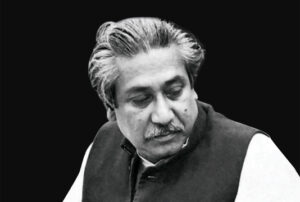Foreign Minister Mahmood Ali has told the secreary general of OIC – Organisation of islamc Conference in Kuwait the other day that calling Rohingya Muslims Bangladeshis does not tally with history, as the Rohingyas came from many neighbouring countries since the 6th century AD at the time of Prophet Muhammad (sm).
Bangladesh has resisted the entrance of persecuted Rohingya Muslims from Myanmar into its territories since the coming of the present Awami League government to power in early 2009, and many boats-full of them have been driven back to the sea ever since. It was apparent that Dhaka was consciously avoiding a confrontation with Myanmar, the only second neighbour in its southeast fringe after India that encircles Bangladesh from three sides.During all past episodes of persecution on the Rohingya Muslims the victims used to walk into Bangladesh with whatever belongings they could carry in head-loads to save their lives, the last major one being in the early 1990s when an estimated 300,000 of them had taken shelter in refugee camps in the Cox’s Bazaar region.
The international community came up with support and helped with the process of negitiations that let to the repatriation of most of the displaced Rohingyas to their homes through strict checking of their papers, though thousands still remained not-repatriated on the plea of their non-confirmation as people of Bumese origin.
In recent years the persecution has turned more violent and international media have reported systematic inhuman persecution of Rohingya habitats and of burning those down. The saddest part being the aggressive role taken by Buddhist monks – brutally suppressed in their democratic uprising against their government – but fomented inhuman violence that included murder and burning of homes of Rohingyas. Who or what prompted these Buddhist monks otherwise universally respected and loved in Bangladsh to take this unbelievable course remains a shock and mystery.
A seasoned career diplomat Mahmood Ali might be knowing Bangladesh in the early ninities of the last century was advised to militarily ‘relaliate’ the driving of the Rohingya Muslims into Bangladesh. At that time the veterans of the first Iraq war were engaged in the April 29, 1991 cyclone rescue and relief operations in Bangadesh under the code name ‘Sea Angels’. But Bangldesh showed restraint.
The similar or one can say even more restraint has been shown by the present government before finally Mahmood Ali has opened up. The present governemnt through various overtures during the last six years wanted the ineternational community to be vocal against the driving away of Rohingyas from their homes. Myanmar even had skirmishes at the border with Bangladesh killing people but did not relent the persecuton, termed the worst in history.
The massive international pressure that mounted following the unfolding of the present unpresented migrant boats crisis with an estimated 25000 floating in the South East Asian seas, most of them Rohingyas, forced Malaysia, Indonesia and Thaland to shlelter floating migrants and Myanmar authorities to rescue those found in its terrirotial waters. Only several days before Yangon had shrugged off responsibility for the migrants on boats while other countries were driving thee boats away from their shores.
Foreign Minister Mahmood Ali’s statement follows Myanmar claim that about 200 migrnts rescued by them are all Bangladeshis. Such statement from Yangon which is denying citizeship to the Rohingyas, their earliest settlements dating back to more than 1000 years, is plausble but extremely beyond the norms of humanity.
During the nearly two centuries of the British rule in India of which Burma was a part there were unrestricted economic and cultural interactions between them and the rest of India, particulrly Bangladesh – the southernmost districts of Chittagong and the hills having the most give and take. Burma was separated by the British from the rest of India in 1935.
What Bangladesh did consider inconvenient to deal with alone for the last one decade is no longer so now. This does not mean taking advantage of the interational opinion created by the Rohingyas themselves by their do or die survival fight. Bangladesh should tell the second nearest neighbour that persecution of their own people would damage their own reputation in addition to damaging their own social fabric. None leaves parental home at will, and the anger associated with forced migration is bound to create incentives for retaliation. Bangladesh shall remain a good enighbour and would not encourage this as its backyeard, but also cannot prevent such developments from taking place. Burma cannot be great only by opening up to electoral processes and democracy. Democracy should be inclusive and guarantee human rights to all sections of their population. If Burma acknowledges the diversity and ensure rights of the diverse ethnic groups these groups in turn will find cores of unity to the Myanmar Union and whole-hearterly work for its continued progress and psosperity that will also benefit them. Things cannot be otherwise in this world that has turned into a global village.



